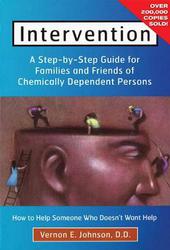
|
Intervention
Paperback / softback
Main Details
| Title |
Intervention
|
| Authors and Contributors |
By (author) VERNON E JOHNSON
|
| Physical Properties |
| Format:Paperback / softback | | Pages:132 | | Dimensions(mm): Height 195,Width 134 |
|
| Category/Genre | Coping with drug and alcohol abuse |
|---|
| ISBN/Barcode |
9780935908312
|
| Classifications | Dewey:616.86 |
|---|
| Audience | |
|---|
|
Publishing Details |
| Publisher |
Hazelden Information & Educational Services
|
| Imprint |
Hazelden Information & Educational Services
|
| Publication Date |
7 January 1986 |
| Publication Country |
United States
|
Description
In simple terms, this book shows how chemical dependency affects those around the addicted person, and teaches concerned people how to help and how to do it right. In Intervention: How To Help Someone Who Doesn't Want Help, Dr. Vernon Johnson describes the process that has successfully motivated thousands of chemically dependent people to accept help. In simple terms, this book shows how chemical dependency affects those around the addicted person, and teaches concerned people how to help and how to do it right. Johnson shows how chemical dependence affects those around the sick person--spouses, children, neighbors, co-workers. He also points out that intervention is not a clinical process, but a personal one that brings families back together.
Author Biography
Vernon E. Johnson, DD (1920-1999), an Episcopal priest and recovering alcoholic, devoted his life to alcohol intervention. Johnson was co-founder of the Johnson Institute, which provided early intervention services for individuals and employers. He was a faculty member of Rutgers University Summer School for Alcohol Studies. Johnson also wrote several books about the treatment of chemical dependency, including I'll Quit Tomorrow, Intervention and Everything You Wanted to Know about Chemical Dependence: Vernon Johnson's Complete Guide for Families.
Reviews"Dr. Johnson has pioneered in this work, and it is no surprise that he writes a masterpiece as a guide for families and friends of chemically dependent persons. Because of its brevity and clarity, the book effectively addresses the intended audience as well as professionals who want to understand how to get someone to accept help." --S. Reaves Lee, MD, Journal of Clinical Psychiatry
|